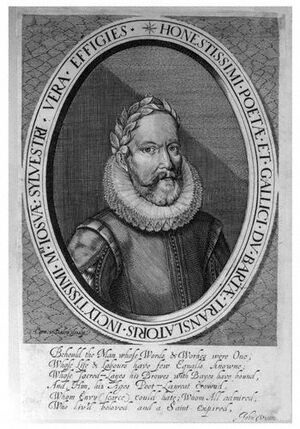Josuah Sylvester facts for kids
Josuah Sylvester (born in 1563 – died 28 September 1618) was an English poet. He is most famous for translating a long French poem into English. This translation became very popular and might have even influenced other famous English writers.
Early Life and Work
Josuah Sylvester was born in 1563. His father was a "clothier," meaning he made or sold cloth. When Josuah was ten years old, he went to school at King Edward VI School, Southampton. There, he learned to speak French very well.
After about three years at school, Josuah started working. By 1591, he was working for the Merchant Adventurers' Company. This was a group of traders who bought and sold goods in different countries.
Later Career
For a short time, Josuah Sylvester worked as a land steward. This meant he managed land for someone else. In 1606, Henry Frederick, Prince of Wales, who was the son of the king, gave him a small payment. This was because Josuah was seen as a special poet for the royal court.
In 1613, he got a job as a secretary for the Merchant Adventurers' Company again. He was sent to Middelburg in the Netherlands, which was then called the Low Countries. Josuah Sylvester died there in 1618.
His Famous Works
Josuah Sylvester is best known for translating a long poem by a French writer named Guillaume du Bartas. This poem was about stories from the Bible. Sylvester translated it into English using a style called "heroic couplets." This means two lines of poetry that rhyme and have a similar rhythm.
Here is a small part of his translation:
Our bisexed Parents, free from sin,
In Eden did their double birth begin.
His translation, called The Divine Weeks of the World's Birth, was published in 1604. It was very popular, especially among people who shared his religious beliefs in England and Germany. Some people think that the famous English poet John Milton might have been inspired by Sylvester's translation when he wrote his own epic poem, Paradise Lost.
However, after a period called the English Restoration, Sylvester's poems became less popular. Another famous poet, John Dryden, even said his writing was "abominable fustian," meaning it was very bad and overly fancy.
 | Percy Lavon Julian |
 | Katherine Johnson |
 | George Washington Carver |
 | Annie Easley |


